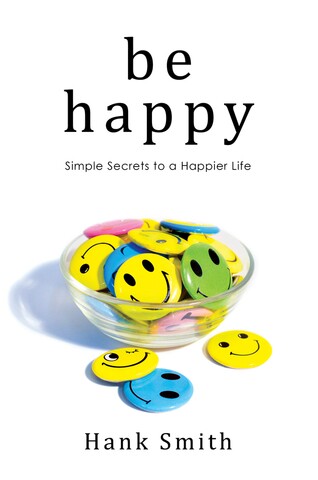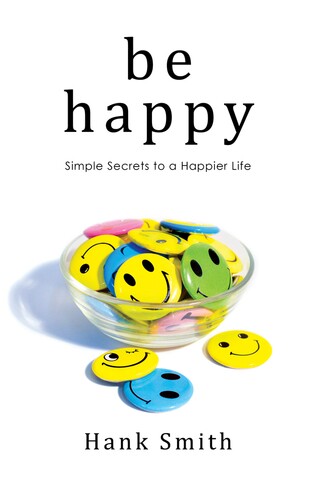Though happiness can sometimes seem elusive, there are a few things we can do to increase our chances of finding—and keeping—happiness. Beloved LDS speaker Hank Smith shares a few of them:
Number One: Be Around People Who Are Happy
Being around people who are happy is the number-one way to be happy yourself. It’s also the number-one indicator of a person’s happiness levels. Why? Simple: happiness is contagious! And unlike the stomach flu, it’s something worth catching. In fact, social life and happiness are so closely correlated that they could almost be twins. Think about the people you spend time with. If they’re happy, chances are that you’re happy too. If they’re unhappy, odds are that you are also unhappy.
I’m guessing I don’t have to spell out any research for you to believe this. I’m sure life has taught you that spending a lot of time around people who are unhappy will definitely impact your happiness. If you’re spending much of your time with the neighborhood whiner or the office grouch or the family malcontent, you might need to make some changes. Hold on—I’m not telling you to get rid of anyone in your life. We believe in keeping promises. You shouldn’t treat people like cell phones or cars, trading a person in for another model when you get tired of the one you’ve got. After all, they need friends too, and you can be someone who plays a very positive role in their lives. No need to isolate anyone. If you have someone in your life who is unhappy but who needs to be in your life, that’s okay—but bring some happy people in. Spend as much time with happy people as you possibly can.
If most of your friends and associates resemble Eeyore—you know, the droopy eyes, the saggy shuffle, the rain cloud overhead—it might be time to mix it up a bit. And if you’re the one who resembles Eeyore, then it’s definitely time to make some changes.
What I am saying is that you need to add more happy people to your life. Look around. It’s pretty easy to tell who the happy people are. They’re the ones who are smiling. Who have a sparkle in their eye. Who laugh. Who do fun things (which entails getting up off the couch). Sit by them at church or at community events. Invite some of them into your circle; start to act like them and do the things they do. You’ll be amazed at what starts to happen.
► You'll also like: 8 Hank Smith Quotes to Help You Be Happy
Number Two: Spend Money on Other People
As it turns out, money really can buy happiness—just not in the way you thought. Dozens of studies have shown that when you take a little of your hard-earned money and spend it to make someone else happy, magical things happen to your own level of happiness.
Works every time.
Let me share a couple of cool examples, and you’ll see how easy it can be. You’ll also see that it doesn’t take a wad of cash to pull it off. Of course, don’t spend money you don’t have. Debt, stress, and unhappiness are friends that hang out together. Debt leads to unhappiness in almost every circumstance. We’re talking here about spending money you have on others, not spending money you borrowed on others.
When one of my friends missed two consecutive weeks of church meetings because of a bad chest cold, a random woman in the ward showed up at her door. She thrust a little gift bag at my friend, sealed with a hug, as she started to explain. (And you know how women are; the gift bag had all that fancy tissue paper poking out the top and a patterned ribbon to tie it all up.) Inside was a bottle of menthol ointment and a pair of floral socks. It was the key to relief, the woman said: rub the menthol ointment on the soles of your feet before going to bed—in a nice, thick layer, she added—put the socks on over the ointment to hold all the goo in, and voila! A night free of coughing and congestion.
You know what? It worked. So did the happiness—for both of them.
I heard of a single dad who loves to take his kids to a restaurant once a month or so for the express purpose of making someone happy. Once there, they sit at their table and check out all the customers in the place. Together, they identify someone who is eating alone—you know, someone who looks a bit down and out.
And then the fun begins. Enlisting their waiter as their accomplice, they carefully point out the customer and announce that they want to secretly pay for that customer’s dinner. Secrecy is a big deal here. Dad surreptitiously slides his credit card to the waiter, who quietly goes to the back and takes care of the bill.
The whole family subtly watches as the lucky diner-o’-the-night learns that his meal has been paid for. The family nearly bursts with glee—undercover, of course—as the diner eagerly glances around the restaurant, trying to figure out who would have done such a thing. Believe me when I tell you it’s one of the highlights of the month for the family, and it always puts a smile on the face and a spring in the step of the lucky diner as well.
Happiness all around for nothing more than the cost of a meal. Heck, even the waiter probably gets a happiness surge out of the whole thing.
It’s not very difficult to give this a try. Run down to the store and buy a random gift for someone in your life. Not overly expensive—just an expression of appreciation. Pay attention to how you feel. My guess is that your internal happiness meter is going to bump up a couple of notches.
Speaking of money, here’s a shocker: If you want to be happy, all you actually need is money sufficient for your needs.
That’s right: lots of research accompanied by astute observation proves that once you’re above the poverty level and make enough to provide for your needs, any money above that has an extremely insignificant impact on your happiness.
Let’s put it another way, punctuated by some cold, hard numbers. Let’s say you live in the United States and you make $75,000 a year. In terms of your happiness level, the difference between that scenario and one in which you make $1.5 million a year is statistically insignificant. At that level, more money will not make you any happier.
No way, you’re thinking. That can’t be right. I remember telling that to one woman who quipped, “Those people just don’t know where to shop.” Another said, “Yeah, but I’d be unhappy in some very nice places.”
Well, think again. And here’s why it works like that: too many of us have been conditioned to think that happiness equates to wealth. The Savior called it “the deceitfulness of riches” (Matthew 13:22). Some may think and even preach that the high you get when you buy something new is the end-all, be-all of happiness. It’s plainly and simply not true. Don’t work your entire life chasing money only to find out you were on the wrong path.
Don’t get me wrong. No one likes to be on a budget so tight it screams with pain. No one enjoys being unable to get an ice-cream cone on the way home. No one likes volleying calls from bill collectors. That’s why it’s important to have sufficient for your needs. But beyond that? Not necessary. Not for happiness, anyway. Time to drop the myth.
Number Three: Cut Down on Screen Time
Screens, whether they be 90-inch plasmas or three-inch phones, can be wonderful tools. I love my phone! It seems to make my life so much easier. But while my phone is a wonderful device, it is a horrible master.
There is nothing inherently evil about a screen, just like there is nothing inherently evil about pizza or candy. However, if I ate pizza and candy four to five hours a day, you can bet it wouldn’t be long before I started having problems.
Many studies have confirmed that too much screen time has damaging effects on the brain structure and function. Screen time has been correlated to depression and anxiety time and again, study after study. Gaming and Internet addictions have been tied to shrinkage of brain matter, impacting the parts of the brain that control emotion and relationship skills. One study found that too much screen time resulted in an insensitivity to loss, while another found that too much screen time resulted in interrupted communication between the two hemispheres of the brain (commonly called “right” and “left”).
What exactly is it about screens that causes these problems? Scientists aren’t sure. Some say it is disrupted sleep, some say it is overloaded sensory systems, some say it is the reduction in physical activity, and others say it is the limited personal connections. The exact causes are still unknown, but there is sufficient evidence to start taking steps to limit screen time for ourselves and our children.
Face it: it's not always easy to feel happy. With all of the worries and trials of day-to-day life, the cares of the world can seem overwhelming. But as popular speaker and author Hank Smith demonstrates, no matter your circumstances, you can be happy—the kind of happy that illuminates you from the inside out, a joy that does not depend on what happens to you, but what you do with what happens.
Featuring an inspiring collection of real-life examples, enlightening doctrinal direction, and motivating goals, Be Happy is the guide you need to start living a happier life, today! Available at Deseret Book stores or on deseretbook.com.
Number Four: Talk to People. In Person.
Seriously? Yes. Absolutely. It’s something that’s easy to do, that doesn’t cost a cent, and that doesn’t require a how-to manual—yet it can be a sizable contributor to your happiness. And here’s all there is to it: have deep, in-person conversations with the important people in your life.
Okay—there are always times when you need to talk on the phone, or text, or IM, or Facebook, or Skype, or use whatever swanky high-tech tools are at your fingertips. Sometimes our early ancestors were reduced to using smoke signals or sending carrier pigeons. Just make sure that’s not all you do. Take the time and make the effort to really engage people, eye to eye. You can start with the dinner table and go from there.
Why? Happy people emotionally connect with other people in real life. Emotional connections with others really help the brain. And the best way to emotionally connect is to talk, face-to-face. Go for a hike, go for a walk, go to lunch—it doesn’t matter where you go, just talk to another human being. It will make a difference in your happiness.
And if you’ve got youth in your home, make a special point of giving them practice in this critical skill. Ever watched a group of kids huddled together, each one texting on a cell phone? They need practice in face-to-face communication—and you can be the one to give them that practice.
Number Five: Laugh!
Happy people laugh. If you want to be happier, laugh. A lot.
I remember an executive who told the story of being in a high-powered meeting with a bunch of people who were her bosses. She, of course, was focused on making the best impression humanly possible when all of a sudden she opened her mouth to make what would have been a stunningly impressive statement. At that very second, the crown on her front tooth flew out of her mouth like a heat-seeking missile and bounced across the glass-topped conference table. There she sat, looking like a cast member from The Beverly Hillbillies.
You can bet everyone at that table—including her—lost every shred of interest in what she had been about to say. And you can bet that everyone at that table—other than her—uttered a silent prayer of gratitude for the skill of their dentists.
And her? She laughed. Hard. And once she was genuinely laughing, so was everyone else at the table.
Every time she tells that story, she still laughs. So do all the people she tells it to. Because she is one of the happiest women around, even with a missing front tooth.
So which comes first, happiness or laughter? This seems to be another chicken-or-the-egg deal. Maybe laughing makes you happy. Maybe being happy makes you laugh. No one really knows if one causes the other, but we do know that they are correlated. They come and go together.
Laughter is very good for you. They knew that clear back in biblical times: Solomon, hailed for his wisdom, remarked that “a merry heart doeth good like a medicine” (Proverbs 17:22). Throughout the ages and around the world, members of royal courts valued the court jester, the colorful clown who made them laugh and in the bargain helped them tolerate the job of governing.
One 13-century surgeon told jokes to his patients on their way out of surgery, knowing that the ones who laughed recovered better. A 16-century English educator prescribed laughter for those afflicted with head colds; a favorite “cure” was being tickled in the armpits. (Try that next time you have a cold.) Humor was even used by ancient Americans—Ojibway Indian doctor-clowns used laughter to heal the sick.
I’m not the only one who says that laughter is good for you. Studies published in the Journal of the American Medical Association say that laughing clears mucus from the lungs, increases the amount of oxygen that circulates through the blood, conditions your muscles, provides muscle relaxation, speeds up circulation, and increases the amount of oxygen delivered to all your body cells. Laughter has even been proven in scientific studies to relieve pain and boost your immunity. Perhaps it’s time to choose the comedy over the drama in the movie theater this weekend?
And all you exercise enthusiasts, consider this: Stanford Medical School psychiatrist William Fry Jr. says that just 20 seconds of laughter is the cardiovascular equivalent of three minutes of strenuous rowing. In fact, he said, it took him ten minutes on a rowing machine to get his heart to the rate it was at after just one minute of hearty laughter. Other experts have said that the changes laughter causes in your body are so effective that laughter may be classified as aerobic exercise. The best part of all? You don’t have to go to the gym or run around a track or use a fancy machine to laugh. All you need is a sense of humor.
But laughter does much more than help you physically. It also reduces stress and improves your perspective on all kinds of things—even things that are as real and distressing as pain. Best of all, it enhances happiness. It’s one of the simplest things you can do to improve your level of happiness.
If you need some inspiration, watch children. Children laugh, on average, upward of 300 times per day. Adults? Fifteen times per day. What happened? Was it the mortgage? Whatever it was, don’t allow yourself to turn into that grumpy neighbor you were scared of as a kid.
So laugh every chance you get. Make sure it’s appropriate. Never laugh at sacred things or take sacred things lightly, something you may recognize as “loud laughter.” Also, watch out for what I call “cheap laughter”—laughing at things that are crude. Cheap laughter isn’t witty or intelligent—it’s like cheap fast food that gives you stomach cramps after you eat. Intelligent humor is like the delicious, mouthwatering food you get at a five-star restaurant.
Lastly, never laugh at someone. I’ve never seen a moment where cruelty was remotely funny. Laughing that bullies or demeans another person will cause the Spirit to withdraw. And when the Spirit withdraws, say good-bye to any real happiness.
But laughing at yourself and your own awkwardness, like our toothless friend did, is perfectly okay. And if you’re out of practice, check out some funny movies or talks or books, or go get a shake with the funniest person you know.
Lead photo from Getty Images.
Face it: it's not always easy to feel happy. With all of the worries and trials of day-to-day life, the cares of the world can seem overwhelming. But as popular speaker and author Hank Smith demonstrates, no matter your circumstances, you can be happy—the kind of happy that illuminates you from the inside out, a joy that does not depend on what happens to you, but what you do with what happens.
Featuring an inspiring collection of real-life examples, enlightening doctrinal direction, and motivating goals, Be Happy is the guide you need to start living a happier life, today! Available at Deseret Book stores or on deseretbook.com.



